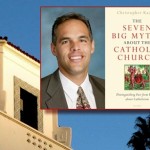Conversations about the Catholic Church often get weighed down by all kinds of myths that not only confuse people and keep them from the truth of what the Church teaches, but it hurts people and prevents ecumenical healing. In a new book, The Seven Big Myths About the Catholic Church, Christopher Kaczor, professor of philosophy at Loyola Marymount University in Los Angeles, tries to make some progress. He talks about Seven in an interview.
KJL: In your new book, you explain that “Catholics aren’t anti science, anti-woman, the Aryan nation.” Defensive much?
KACZOR: I think a good defense and a good offense are necessary to make progress towards the truth. Unfortunately, there are many people who believe that the Church is against women or against science. In The Seven Big Myths about the Catholic Church, I challenge the most common myths, the ones that many secular people and inactive Catholics, among others, believe. If many people thought that Catholics were members of the Aryan nation, I would have included a treatment of this as well. Relatively few people believe Catholicism is racist, if only because the majority of Catholics in the world are people of color.
KJL: “Christianity is properly measured not by its great sinners but by its great saints” you write, “for it is the saints who have lived out the Gospel message, not the great sinners.” Isn’t that conveniently counting people there?
KACZOR: Not really. How would you evaluate the effectiveness of a medication in clinical trial? Would you look at how the medication worked for those who took it as directed or would you look at how it worked for people who skipped doses or didn’t take the medication at all? G. K. Chesterton was onto something, “Christianity has not been tried and found wanting; it has been found difficult and not tried.”
KJL: Do you actually defend the Catholic Church’s treatment of Galileo?
KACZOR: No and yes. No, I don’t defend the Catholic Church’s treatment of Galileo insofar as the ecclesial judicial authorities in the trial of Galileo made serious mistakes. The authorities wrongly condemned heliocentricism which was, at that time, a proposed but as yet unproven view. However, this error — and other errors of a disciplinary and judicial nature — were not a formal part of Catholic teaching. Then, as now, Church officials can and do make errors, unfortunately sometimes serious errors, in terms of discipline and order within the Church community. But yes, I do defend the Church insofar as the Galileo case was only partially based on scientific disputes but had much to do with conflicts of personality, politics, and theology of the time. In many people’s minds, the condemnation of Galileo has become a Catholic condemnation of science. In fact, at issue was not chiefly the scientific views of Galileo (which were held by many Catholics of the time, including the Catholic cleric Copernicus and Jesuit priests in good standing), but more centrally whether Galileo broke agreements he had made about in what manner to teach his views and that Galileo insisted on changing the dominant interpretations of scripture at the time. Both Galileo himself (who remained a faithful Catholic his whole life) and those involved in his trial such as St. Robert Bellarmine agreed that there can never be a true conflict between science and faith. Apparent but not real conflicts can arise through a mistaken interpretation of faith (as was made by those who condemned Galileo), a misunderstanding of science (e.g. that science requires atheism), or both. It is a myth — albeit a persistent myth — that the Church opposes science.
KJL: How can you have a chapter on the Myth of Catholic irrationality when Catholics do believe some wild things that can’t be proven?
KACZOR: Faith does transcend reason, but faith does not contradict reason. Faith involves trusting someone and accepting what is revealed by this person as true. In a human sense, we have faith in our friends. We can know certain things about our friends such as their general height, age, and appearance from using our reason. But others things about them we can know only if our friends reveal them to us, such as their beliefs, history, and inner experiences. However, it is not irrational to believe what our friends reveal to us about themselves, even if we cannot verify that they are telling us the truth about their inner thoughts and feelings. So too, faith in God involves accepting what God reveals to us about his own inner life; for example, that God is Father, Son, and Holy Spirit. We cannot prove the Trinity through philosophy, but we can accept it through faith. This acceptance is not contrary to reason but does go beyond what reason can know through its own power.
KJL: Why do you insist on pretending the embryo is the same as you or I?
KACZOR: I don’t. There are innumerable differences between you and I and human embryos. We are big; they are small. We are powerful; they are weak. We are able to defend ourselves; they are not. The question is, do any of these differences (or any other differences) mean that it is morally acceptable to kill human embryos? The human being goes through many stages of development from the embryonic stage, to the fetal stage, to the newborn stage, through the phase of childhood, the teenager years, and adulthood. I believe in an ethics of inclusion in which all human beings regardless of race, religion, age, or condition should be accorded respect and basic human dignity. Whenever we have engaged in the ethics of exclusion, we have made horrible mistakes. For this reason, and for many others detailed here, I hold that all human beings, including the human embryo, should be protected by law and welcomed in life.
KJL: How are the four levels of happiness helpful?
KACZOR: We all want happiness, but how do we find it? Jesuit Father Robert J. Spitzer distinguishes four levels of happiness. Level one happiness is bodily pleasure obtained by drink, food, drugs or sex. Level two happiness has to do with competitive advantage in terms of money, fame, power, popularity or other material goods. Level three happiness involves loving and serving other people. And level four happiness is found in loving and serving God. Although we may desire each level of happiness, not every level provides equal and lasting contentment.
In life, we are often faced with a choice between one level of happiness or another. For example, the Olympic athlete chooses success in athletics over pleasures of the body, which might be found in abusing drugs or alcohol.
I can have more level-one happiness if I sleep late on Monday morning, but I would sacrifice level-two happiness because I wouldn’t be able to earn money at work. Or, I could gain more of a certain kind of happiness by cheating others out of their money, but I would be sacrificing a higher level of happiness because being unfair to others is the opposite of helping them. Since we often have to choose one activity over another, it makes sense to think through what kind of activities will truly lead to lasting happiness.
The first level of happiness — pleasures of the senses — has several advantages. It is easy to get; it arrives fairly quickly; and it can be intense. Level-one happiness, though, leaves almost as quickly as it arrives. In addition, we build a tolerance to certain things that bring us this level of happiness so that more is needed to achieve the same degree of enjoyment. Unfortunately, many of these pleasures can lead to addictions, and the addict’s enslavement is the opposite of real happiness. Finally, this lowest level of happiness is somewhat superficial. We all want it, but we also want to achieve something more meaningful and important in life.
The next level of happiness gives greater meaning and significance than the first. It involves not just keeping up with the Joneses, but also surpassing them — in money, fame, popularity or status. We celebrate such achievements as a culture — the valedictorian, the star athlete, the millionaire. But will such success lead to lasting happiness?
Let’s take money as an example of a level two goal. More money can make you significantly happier if you are in poverty. If you don’t eat three meals a day and you sleep under a bridge, then additional money can make a great difference. Yet psychologist David Myers shows that once a person escapes from dire poverty, additional amounts of money do not significantly increase happiness. In other words, if you compare a person making $30,000 a year, another making $100,000 and a third making $500,000, there is likely little difference in self-reported happiness or levels of depression.
KJL: Don’t pretend my life couldn’t be happier if I won the lottery!
KACZOR: Researchers have studied lottery winners extensively. It turns out that Lottery winners — after the shock wears off — report being no happier than they were before winning. Fortune 500 executives on the whole have average levels of happiness, and 37 percent of rich business leaders are less happy than the average person. As St. Thomas Aquinas pointed out more than seven centuries ago, we want many things that no amount of money can buy. We cannot find true happiness in more fame, power or “winning” of any kind. Still, if you win the lottery, let’s split the earnings, so I can test the theory just to make sure.
KJL: Why is hope so important and what is it exactly?
KACZOR: The theological virtue of hope, as understood by Aquinas, has as its object the eternal happiness of heaven, to be achieved with God’s help. This virtue is vital for a person’s resilience in suffering. The psychologist Martin Seligman found that a person’s style of explanation determines whether they are crushed and destroyed by the setbacks of life, or whether they are resilient. In the face of evils, the pessimist believes: “This setback ruins everything, this will last forever, and there is nothing I can do about it.”
The Christian with the theological virtue of hope is, in Seligman’s terms, an optimist with the resources to embody resilience in the face of suffering. In the face of even the worst of life’s trials, the hope-filled Christian can say: “This evil will not last forever because in the end, ‘God shall wipe away all tears from their eyes; and there shall be no more death, neither sorrow, nor crying, neither shall there be any more pain: for the former things are passed away’” (Rev 21:4). No evil inflicted from without can ruin everything, since the hope of heaven can never be stolen away, but only destroyed by one’s own sinful action. Indeed, even deadly sin does not destroy the hope of heaven, for as long as life endures, repentance is possible. Finally, there is always “something I can do about it” for the hope filled Christian. Of the deadly sin, I can repent. In the face of non-moral evils, I can pray and work. In the face of suffering, I can unite what I endure with the sufferings of Jesus. “I rejoice in my sufferings for your sake, and in my flesh I am filling up what is lacking in Christ’s afflictions for the sake of his body, that is, the Church” (Col 1:24). The “optimistic explanatory style” advocated by Seligman is embedded in the theological beliefs and practices of the Christian with hope.
KJL: Isn’t “false freedom” simply anything the Catholic bishops don’t want you to do?
KACZOR: No, false freedom is anything that undermines your true happiness. We all seek happiness; but since we can undermine our own happiness through not realizing what will make us truly happy or by failing to do actions that contribute to authentic happiness, it is vital to figure out what will and will not make a difference. Like a good doctor, the teachings of Jesus point out the way to true happiness. I believe that the authentic interpretation of the teachings of Jesus is given by the Catholic bishops in communion with the pope, but what the bishops teach does not make an action good or evil.
KJL: How do we come to a consensus about what freedom is?
KACZOR: A consensus should be founded on the truth. If we want to have a consensus, then we should find out — to the best of our ability — what is true.
KJL: How is mutual subjection freedom?
KACZOR: Happiness and freedom are related. True freedom is that which serves our true happiness; false freedom (e.g. taking heroin) by contrast cannot secure true happiness for us. As I argue in the The Seven Big Myths about the Catholic Church, true happiness is found (in part) in good relationships with others. Real friendship with others cannot be a “one way street” in which one person dominates another person or fails to have good will for the other. This mutuality in a friendship means that both friends must take into account the well-being of the other. A true friend acts in accordance with what serves the friend, at times putting the well-being of the other ahead of personal preferences. So, mutual subjugation — in the sense of self-giving to one’s friend — is necessary for happiness and true freedom.
KJL: “Women were among the earliest and most courageous followers of Jesus, yet he did not call them to be among the Twelve.” Is that really the best you’ve got? Different times. Way too radical.
KACZOR: To be radical means to get to the root, and the root of Christianity is Jesus. The behavior, teaching, and attitude of Jesus towards women (and everyone else) exemplifies a model of what all people of good will should strive to embody in their own lives. Catholics believe that Jesus loved us enough to want to be with us not only in his words recorded in Scripture, not only in the Church community who gathers to remember and celebrate Jesus’s life, but also in the Sacraments – outward signs instituted by Christ to give us a share in his divine life. The seven sacraments – Baptism, Confession, Holy Communion, Confirmation, Marriage, Anointing of the Sick, and Holy Orders – on a Catholic view, are given by Christ himself. Since Jesus has established these Sacraments himself, no one including the pope and bishops, is free to add new Sacraments — though we can pray in various other ways — nor is anyone free to abolish Sacraments. Jesus himself established the sacraments, and the Church, in obedience to the Lord, is free only to follow what Christ has established.
The Sacrament of Baptism, for example, must make use of water and not sand. This does not imply that sand is less important or valuable than water; indeed, those lost at sea need an island of sand much more than they need water. Similarly, the Sacrament of Anointing of the Sick makes use of holy oils rather than bread or wine, even though bread and wine — or at least food of some kind — is much more important to human survival than is oil for anointing. In like manner, the Eucharist must make use of bread and wine, even in culture contexts like Germany, where presumably many celebrating the Eucharist would prefer a meal of sausage and beer. Similarly, the Church teaches that Christ established that the proper recipient of the sacrament of Holy Orders is a baptized male. Jesus — though sinless and the perfect exemplar of love towards all — did not include any women among the twelve apostles. As Joseph Cardinal Ratzinger noted before his election as Pope Benedict XVI: “One forgets that in the ancient world all religions also had priestesses. All except one: the Jewish. Christianity, here too following the ‘scandalous’ original example of Jesus, opens a new situation to women; it accords them a position that represents a novelty with respect to Judaism. But of the latter he preserves the exclusively male priesthood.” Jesus of course broke with Jewish custom in numerous ways, but here he retains it. Just as Christ’s selection of only men to be his apostles did not exhibit or imply in any way the inferiority of women, so too the continuation of this particular apostolic ministry by men does not manifest the belief that women are inferior. The alternative is to label Jesus himself sexist, when just the opposite is true.
KJL: Why do you end with the abuse scandals?
KACZOR: The abuse scandals are extremely important and often misunderstood, so I wanted to end the book on the topic. Many people mistakenly believe that celibacy causes pedophilia or that Catholic priests are more likely to sexually abuse children than other kinds of people. In The Seven Big Myths about the Catholic Church, I provide a great deal of evidence that these beliefs are false.
KJL: Why are forgiveness and fidelity so important?
KACZOR: Forgiveness is extremely important to happiness. The late University of Michigan psychologist Christopher Peterson held that forgiveness is the single most important factor in a person’s happiness. As mentioned earlier, strong relationships are essential for happiness. However, since all people eventually let down their friends or family in big or small ways, without forgiveness these relationships break down, leaving people isolated and alone. Likewise, fidelity is important. Friendship involves mutual good will, loyalty, and trustworthiness. Without fidelity in friendship, the friendship is unlikely to survive and thrive.
KJL: How does a prohibition on divorce help women?
KACZOR: In the ancient world, men could divorce their wives but not vice-versa. The teaching of Jesus about marriage affirms an equality between husband and wife. A wife cannot divorce and remarry, and neither may her husband divorce and remarry. Marriage is about unconditional love that lasts “until death do us part.” The unconditional nature of the love in marriage is good for husband, wife, and children. In terms of what they receive, it is good for the spouses because (if the other spouse carries out the vow) they can experience from their spouse a taste of what God’s unconditional love for them is like. In terms of what they give, it is good for spouses to give love as God gives love – unconditionally. So both in terms of what they receive and what they give, the unconditional love of marriage helps the spouses. If children are involved, they too benefit from their parents loving each other in good times and in bad, in sickness and in health, so long as they both shall live. The teaching of Jesus on divorce affirms the equal responsibility of husbands and wives to have unconditional love for their spouse.
KJL: Most murderers, rapists, thieves, and scoundrels of the highest order are men. What business does a man have telling me we must first reconsider the value of fertility and having children?
KACZOR: This is an example of an ad hominem argument, a logical fallacy. It falsely assumes that what I say cannot be true or is irrelevant because of my gender. If what I write is false, it should be rejected because it is false not because I am a man. If what I write is true, it should be accepted as true, even if the messenger is a man. In the book, I argue that having children greatly benefits the married couple, helping them to realize the goal of erotic love to have a complete union, helping to solidify their friendship, and helping them get to heaven. I may be wrong, but I am not wrong simply because I am a man.
KJL: “The point of contraception is to make sure that there is not a complete union between the two.” Aren’t you making a bigger deal of this than it is?
KACZOR: Erotic love — by its very nature — is a drive towards deeper unity with the beloved, and children are a wonderful manifestation of the unity between husband and wife. Each child unifies the husband and wife with each other in a physical sense. Every one of us is a living manifestation of the union of our mother and father, half of our DNA from each. This unity, like erotic love itself, is exclusively bringing together one man and one woman. No other woman is the mother of his child; no other man is the father of her child. As long as the child lives, they are unified in their offspring. This unity is characteristically not limited to the physical. Normally, a unity of will and affection also arises between the mother and father. They both love their child, both want what’s best for that child, both delight in the child’s good fortune, and mourn the child’s misfortunes. Even in the case of divorce, very often the parents still share a united will to help their child and will put away their differences and become united again at important events in the child’s life, like graduations and weddings.
Ideally, the unity of the parents includes running a household and raising the child together. They work together, as mother and father, to provide for the child’s many needs. Their unity which began as a unified sexual act continues over the years as a unity of shared activity ordered to the education and raising of the child.
Children therefore help parents realize the goals of erotic love — to be together, unified physically, psychologically, socially, and emotionally. Each child unifies these two people together, and no one else, in a unity that is lasting and exclusive. Children are a good of marriage that unites the husband and wife in a way that realizes the aspirations of erotic love.
The use of contraception acts against the unity sought by erotic love. A couple only uses contraception when one does not want to a child to unite them. Although their bodies are partially unified, the point of contraception is to make sure that there is not a complete unity between husband and wife. Contraception, through various means, seeks to make sure that part of him (sperm) does not unite with part of her (egg). Contraception also involves, against the goals of erotic love, the acceptance of the whole person. Part of the person, the potential to become a father or a mother, the fertility of one or both parties, is intentionally rejected, at least for the time being. If this analysis is correct, then contraception does not serve the same goals as erotic love.
KJL: What’s real friendship? Can there be a marriage without it?
KACZOR: I think Aristotle was right that real friendship involves mutual good will, shared activity, and shared emotional life. A marriage implicitly involves a commitment to have a friendship with someone else, but in the vows the couple is not promising to be friends. They are not even promising to have erotic love for each other (though hopefully they are friends and they do have erotic love for each other). The promise of the marriage vow is not the commitment to always feel the pull of erotic love. We cannot directly control our emotions, longings, and desires. Nor is the oath of marriage the promise to always be friends, since we cannot control anyone but ourselves and friendship necessarily involves mutual good will. So what is promised? In marriage, the spouse promises to love with not eros or philia but rather with agape. What is agape? Perhaps the most famous description of agape is given by St. Paul:
Love (agape) is patient, love is kind. It is not jealous, love is not pompous, it is not inflated, it is not rude, it does not seek its own interests, it is not quick-tempered, it does not brood over injury, it does not rejoice over wrongdoing but rejoices with the truth. It bears all things, believes all things, hopes all things, endures all things. Love (agape) never fails. (1st Corinthians 13: 4-8).
Agape is the kind of love that is a decision, not an emotion. You can be mad as hell at someone and still have agape for that person. Feelings are transitory. Agape — in bearing all things, enduring all things, and never failing — is not. Agape is a choice, not an emotion. Feelings may or may not lead to action. Agape is ordered to action, action of a particular kind namely what is beneficial to someone. To boil down agape to its most fundamental definition, agape is a determination of one’s will to do good for someone. Marriage is the promise to have agape for the spouse as spouse.
KJL: How would legalized same-sex marriage harm advocates of traditional marriage? How do letting people live as they want hurt?
KACZOR: Advocates for traditional marriage argue that marriage is a pre-legal, natural institution that the state merely recognizes (traditional view). Proponents of same sex marriage (SSM) deny this and hold that marriage is a mere legal construction (non-traditional view) that can and should be changed. Legal approval of SSM endorses the non-traditional view of marriage, thereby providing societal disapproval of the traditional view further socially destabilizing it.
In addition, if SSM is legalized, opponents of SSM would be forced to act against their consciences or be penalized. In Massachusetts, Catholic Charities was forced to no longer facilitate adoptions because of legal pressure. The children of advocates of traditional marriage with kids in public schools would be taught about marriage in a way that undermines the values that are taught in the home. In 2008, a New Jersey lawsuit forced EHarmony to offer its services to same sex couples, against the wishes of the company founder whose research on finding matches had focused only on opposite sex couples.
KJL: What’s the most pernicious of the myths about the Church?
KACZOR: I’m not really sure. My impression is that different myths cause intellectual damage to different people.
KJL: What do you love most about the Church?
KACZOR: I love that the Church provides me with the sacraments. I love that the Church has a rich intellectual tradition. I love that the Church has inspired beautiful art, music, and literature. I love that the Church has heroic saints. Finally, I am immensely grateful that the Church — priests, sisters, and lay Catholics alike — loves me and has helped me since before I was born.















